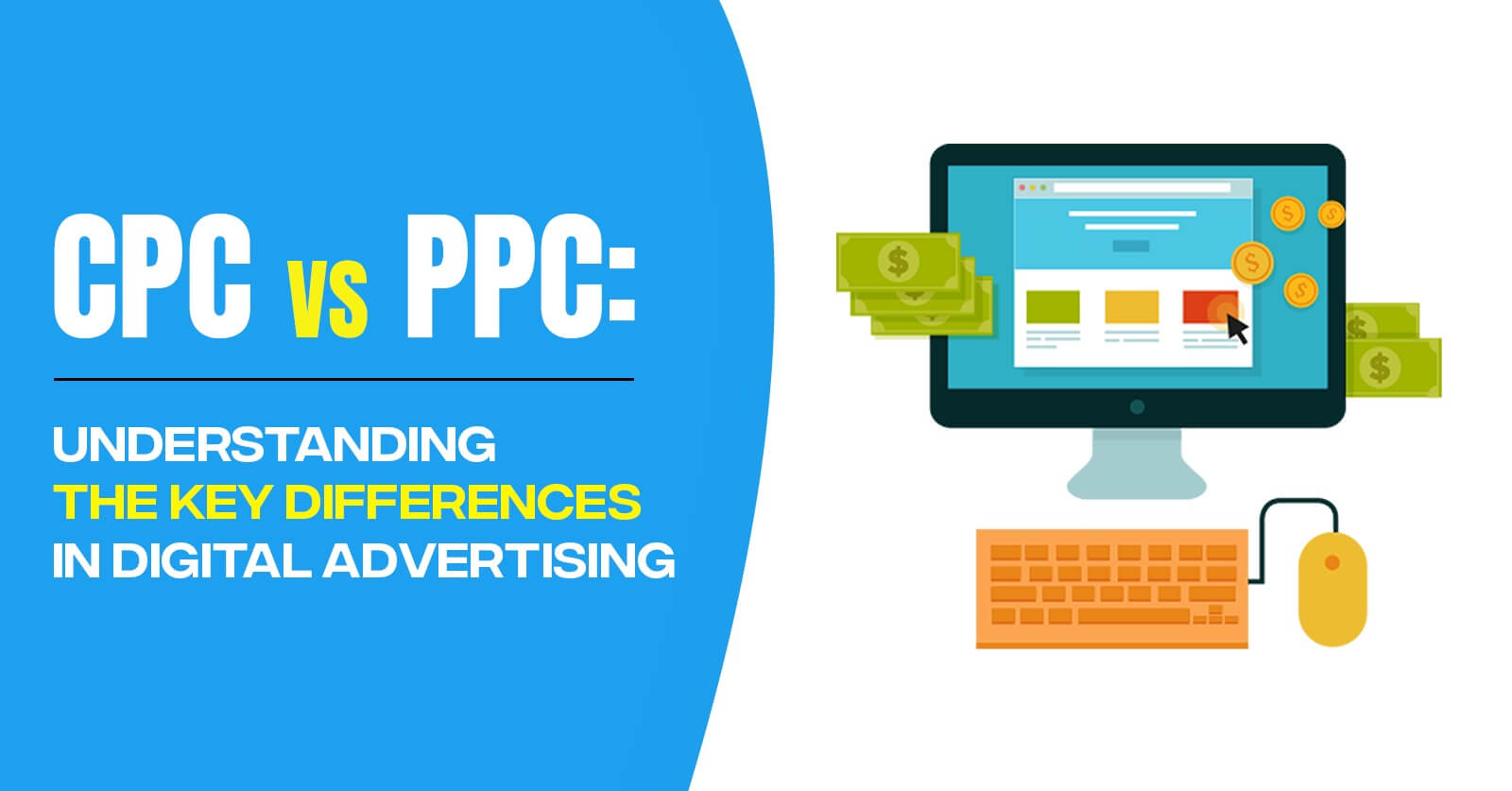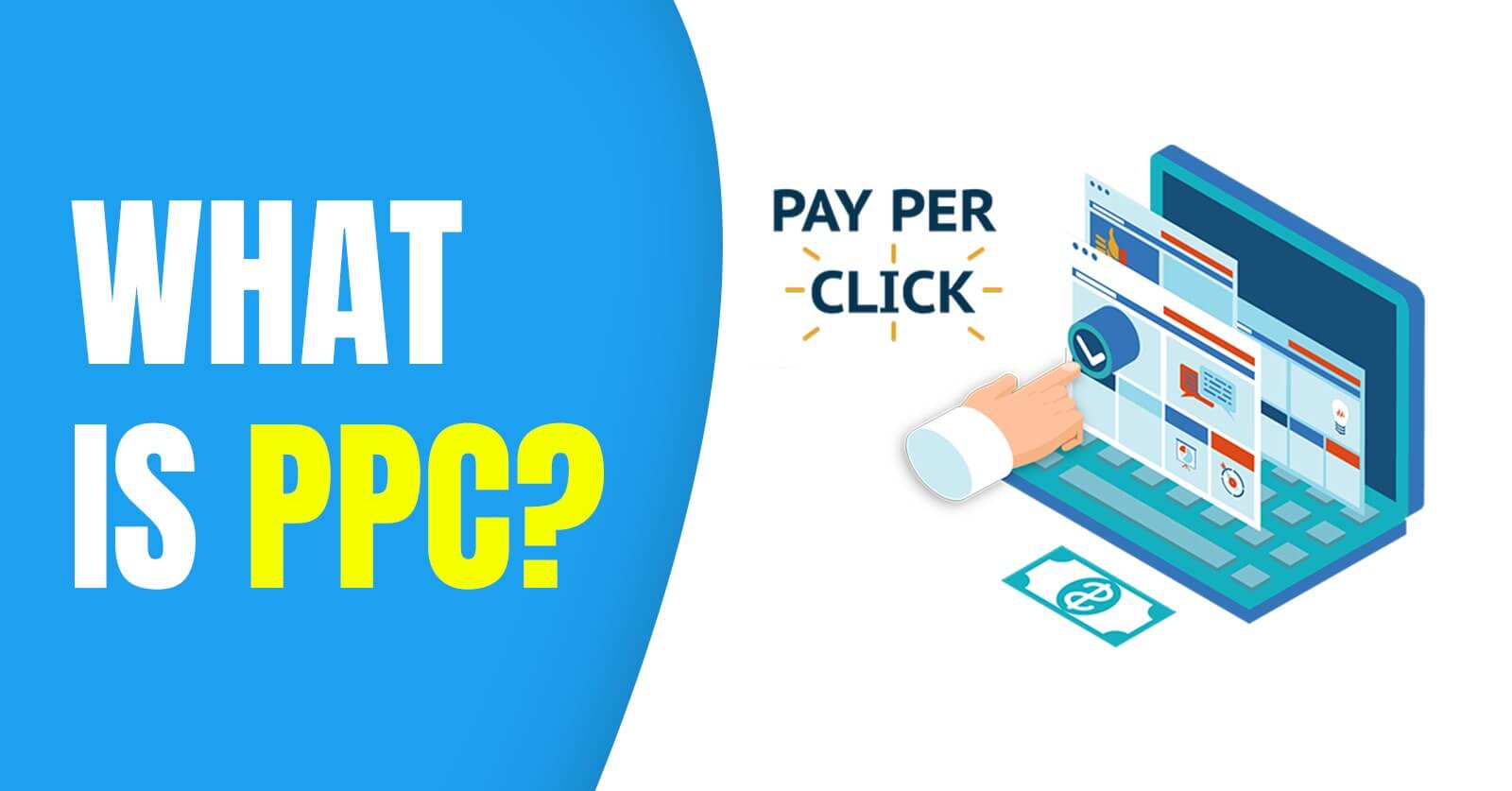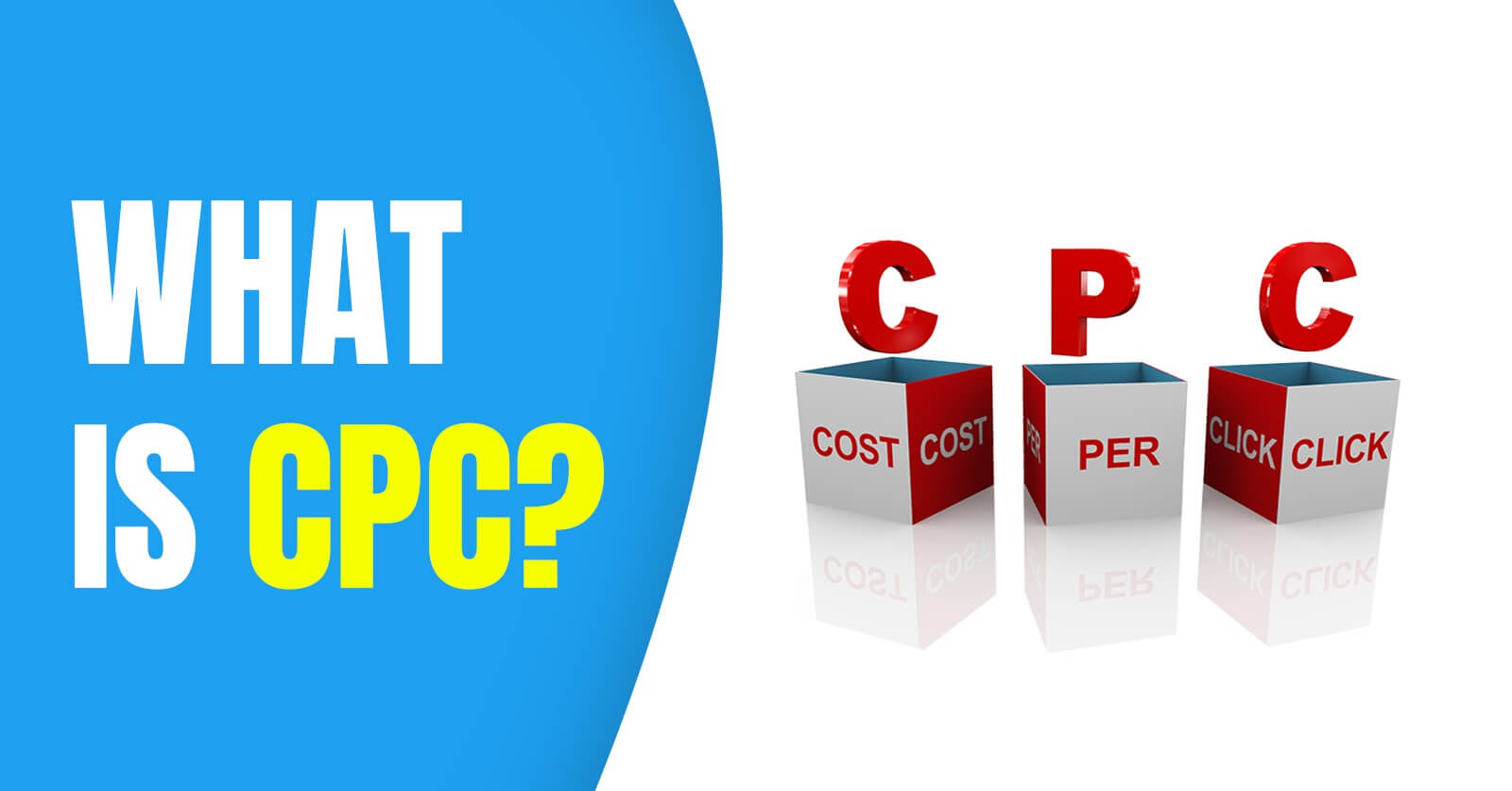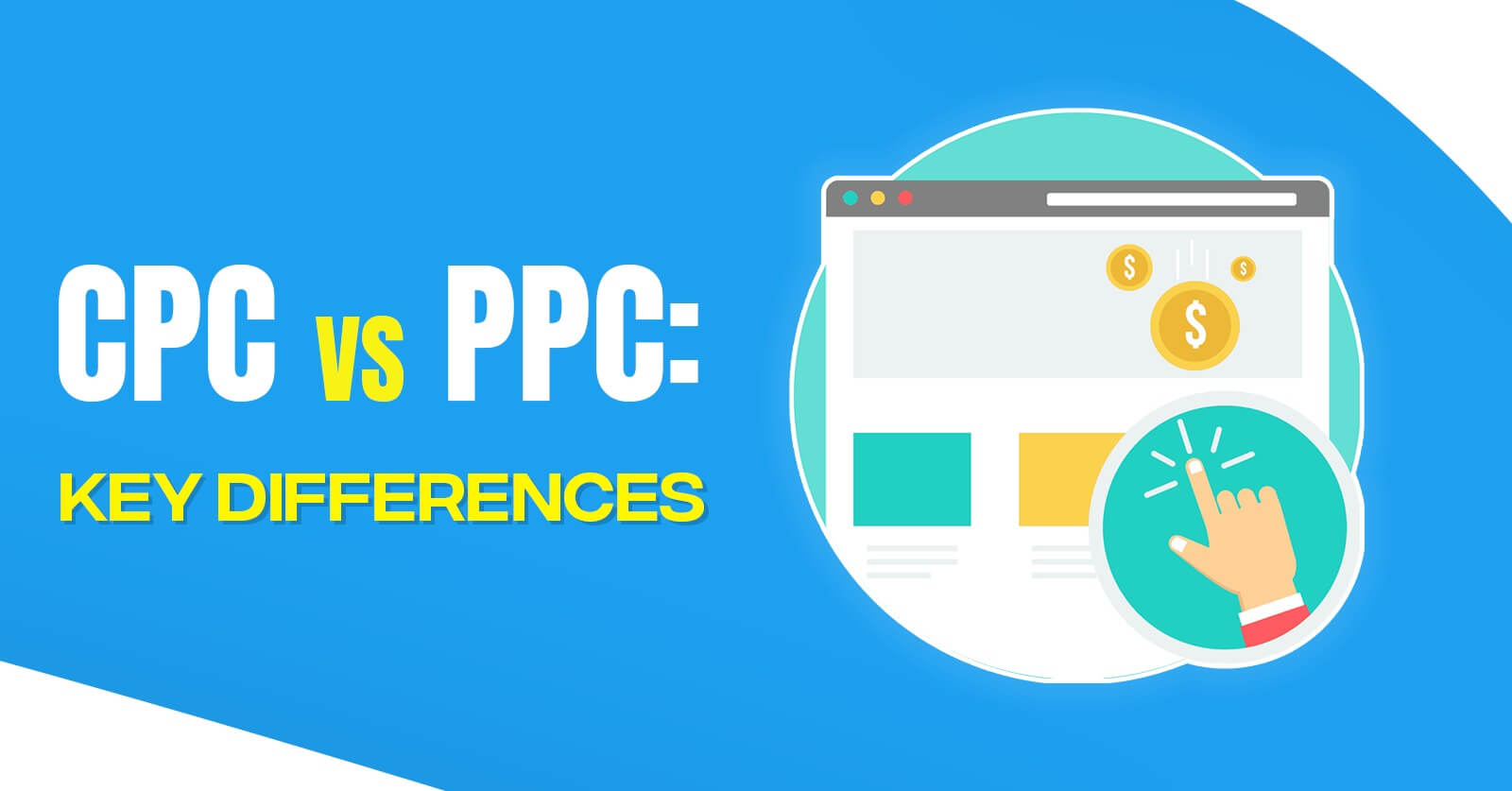PPC vs. CPC: Understanding the Key Differences in Digital Advertising

In today’s digital age, businesses have a plethora of advertising options at their disposal. Two popular methods that often come up in discussions about online advertising are PPC (Pay-Per-Click) and CPC (Cost-Per-Click). PPC vs CPC are closely related but have distinct differences: PPC refers to the broader concept of paying for clicks, while CPC specifically focuses on the actual cost per click. While these terms are often used interchangeably, it’s important to understand that they have distinct differences. In this blog post, we will explore the primary differences between PPC and CPC, their applications in digital marketing, and the benefits they offer to businesses.
While these acronyms may sound similar, it is essential to understand the nuances between them. We will delve into the world of PPC vs. CPC, exploring their definitions, functionalities, and implications in digital marketing.
What is PPC?

PPC stands for “Pay-Per-Click.” It is an online advertising model where advertisers pay a fee each time their ad is clicked. PPC is commonly associated with search engine advertising platforms like Google Ads, but it can also refer to other forms of online advertising such as social media advertising.
How Does PPC Work?
PPC advertising services allow businesses to create and display ads on various platforms, such as search engines and social media. Advertisers bid on specific keywords relevant to their target audience. When users search for those keywords or browse websites related to the keywords, the ads are displayed. Advertisers only pay when their ads are clicked, making it a cost-effective approach for driving targeted traffic to their websites. Developing a well-crafted PPC strategy is crucial for businesses to effectively target their audience, optimize ad spend, and maximize conversions and ROI through strategic keyword selection, compelling ad copy, precise targeting, and ongoing campaign monitoring and optimization.
What is CPC?

CPC stands for Cost-Per-Click. It is a pricing model used in online advertising, where advertisers pay a certain amount each time someone clicks on their advertisement. The cost per click is determined through bidding or predetermined rates and can vary based on factors such as keyword competitiveness, ad quality, and the advertising platform being used. CPC is commonly associated with pay-per-click (PPC) advertising campaigns, where advertisers only pay for actual clicks on their ads rather than impressions or other engagement metrics. It provides businesses with a measurable and direct cost associated with driving traffic to their website or landing page.
How Does It Work?
CPC (Cost-Per-Click) works by advertisers bidding on specific keywords or placements to display their ads. When a user conducts a search or visits a website that matches the chosen keywords or placements, the ad is eligible to be shown. The bidding process determines how much an advertiser is willing to pay for each click on their ad.
The ad platform takes into account factors such as bid amount, ad quality, and relevance to determine which ads will be displayed and in what order. When a user clicks on the ad, the advertiser is charged the amount they bid for that click.
The actual CPC may vary based on the competition for the keywords or placements and the quality of the ads. Advertisers can set a maximum CPC bid, which is the highest amount they are willing to pay for a click. The ad platform then tries to deliver the ad within that specified bid.
CPC vs. PPC in Digital Marketing and Advertising

While PPC and CPC are closely related, they have different implications in digital marketing and advertising. PPC refers to the broader concept of paying for clicks, including CPC. PPC encompasses various advertising models, such as display advertising, social media advertising, and remarketing. On the other hand, CPC is a specific pricing model within the PPC framework, focusing on the actual cost per click.
PPC vs. CPC Example
Here are some examples of PPC (Pay-Per-Click);
- An e-commerce store, XYZ Electronics, runs a PPC campaign targeting keywords like “buy smartphones online” and “best electronics deals.”
- A local plumbing service, ABC Plumbers, uses PPC to target keywords such as “emergency plumber” and “leak repair” to attract customers in their service area.
- A travel agency, Wanderlust Travels, creates a PPC campaign focusing on keywords like “vacation packages” and “book flights online” to drive traffic to their website.
- A software company, Tech Solutions Inc., runs a PPC campaign targeting keywords related to their software products, such as “CRM software” and “project management tools.
Example of CPC (Cost-Per-Click);
- A clothing retailer, XYZ Fashion, decides to run a CPC campaign to promote their new summer collection.
- They select popular fashion-related websites and blogs as ad placements for their campaign.
- XYZ Fashion sets a maximum CPC bid of $0.50 for each click on their ads.
- When a user visits a website where XYZ Fashion’s ad is displayed, they have the option to click on the ad.
- If a user clicks on XYZ Fashion’s ad, the retailer is charged $0.50 for that click.
Benefits of PPC
-
Instant visibility
PPC ads provide businesses with immediate visibility on search engine results pages, ensuring quick exposure to their target audience.
-
Targeted Reach
PPC platforms offer advanced targeting options, allowing businesses to display their ads to specific demographics, locations, and interests, ensuring they reach the right audience.
-
Cost control
With PPC, businesses only pay when their ads are clicked, providing better control over advertising costs and ensuring budget efficiency.
-
Measurable results
PPC platforms provide detailed analytics and reporting, allowing businesses to track the performance of their ads in real-time, measure key metrics like click-through rates and conversions, and make data-driven decisions for optimization.
-
Brand exposure and awareness
PPC ads can help businesses increase their brand exposure and awareness as they appear prominently on search engine results pages, even if users don’t click on them
-
Competitive advantage
PPC allows businesses to outbid competitors for ad placements, ensuring they have a better chance of being seen by their target audience and gaining an edge in the market
Benefits of CPC
-
Competitive advantage
CPC advertising allows businesses to have precise control over their advertising costs by setting a maximum bid for each click. They only pay when someone actually clicks on their ad, ensuring budget efficiency.
-
Targeted Reach
CPC platforms offer advanced targeting options, enabling businesses to display their ads to specific audiences based on demographics, interests, and online behavior, maximizing the relevance of their ad placements.
-
Measurable results
CPC advertising provides businesses with clear and measurable results. They can track the number of clicks, click-through rates (CTR), conversions, and other key performance indicators (KPIs) to assess the effectiveness of their campaigns.
-
Return on investment (ROI)
By analyzing the cost per click and conversion rates, businesses can calculate their ROI for CPC campaigns and determine the profitability of their advertising efforts.
-
Flexibility and optimization
CPC campaigns can be adjusted and optimized in real-time based on performance data. Advertisers can modify bids, refine targeting, test different ad variations, and optimize their campaigns to maximize results.
Conclusion
In summary, PPC and CPC are both integral components of digital advertising, but they have distinct differences. PPC encompasses various advertising models, while CPC specifically refers to the cost incurred per click. Understanding the nuances between these two terms is essential for businesses looking to leverage online advertising effectively. By utilizing PPC and CPC strategically, businesses can maximize their reach, drive targeted traffic, and achieve their marketing objectives.If you are searching for a digital marketing company in Indore, you can find a range of reputable agencies offering comprehensive online marketing solutions tailored to your business needs. Like Bluetick Consultants which is a digital marketing company and provide PPC and CPC advertising services.
FAQs
-
Is PPC the same as CPC?
No, PPC (Pay-Per-Click) and CPC (Cost-Per-Click) are not the same. While they are closely related, PPC is a broader concept that encompasses different advertising models, including CPC. PPC refers to the practice of advertisers paying a fee each time their ad is clicked, regardless of the cost. On the other hand, CPC specifically focuses on the actual cost per click, representing the amount advertisers pay for each individual click on their ads. In essence, PPC is the overarching concept that includes CPC as a specific pricing model within it, highlighting the direct cost associated with clicks in online advertising campaigns.
-
How can businesses benefit from PPC advertising services?
PPC advertising services offer instant visibility, precise targeting, and cost-control benefits. Businesses can reach their target audience quickly, ensuring their ads are displayed to users actively searching for relevant products or services.
-
What are the advantages of CPC advertising?
CPC (Cost-Per-Click) advertising offers several advantages for businesses:
Cost control: CPC allows businesses to have direct control over their advertising costs. They only pay when someone clicks on their ads, ensuring that they are paying for actual engagement rather than impressions.
Budget optimization: Since businesses can set a maximum CPC bid, they have better control over their budget allocation. This helps in managing advertising expenses and ensuring that the budget is effectively utilized.
Measurable ROI: With CPC, businesses can easily measure the return on investment (ROI) for their advertising campaigns. By tracking the cost per click and analyzing conversion rates, businesses can assess the effectiveness and profitability of their CPC campaigns.
-
Can PPC and CPC be used together in a marketing campaign?
Yes, PPC (Pay-Per-Click) and CPC (Cost-Per-Click) can be used together in a marketing campaign. In fact, CPC is a pricing model within the broader PPC framework. When running a PPC campaign, advertisers can set their maximum CPC bids, which determine the highest amount they are willing to pay for each click on their ads. By utilizing both PPC and CPC, businesses can effectively manage their budget, track the cost per click, and measure the overall performance of their marketing campaign.
-
How do I determine the success of my PPC or CPC campaign?
The success of your PPC or CPC campaign can be determined by analyzing key performance indicators (KPIs) such as click-through rates (CTR), conversion rates, cost per conversion, return on ad spend (ROAS), and overall return on investment (ROI). By tracking and evaluating these metrics, you can gain insights into the effectiveness of your campaign and make data-driven decisions for optimization and improvement.




